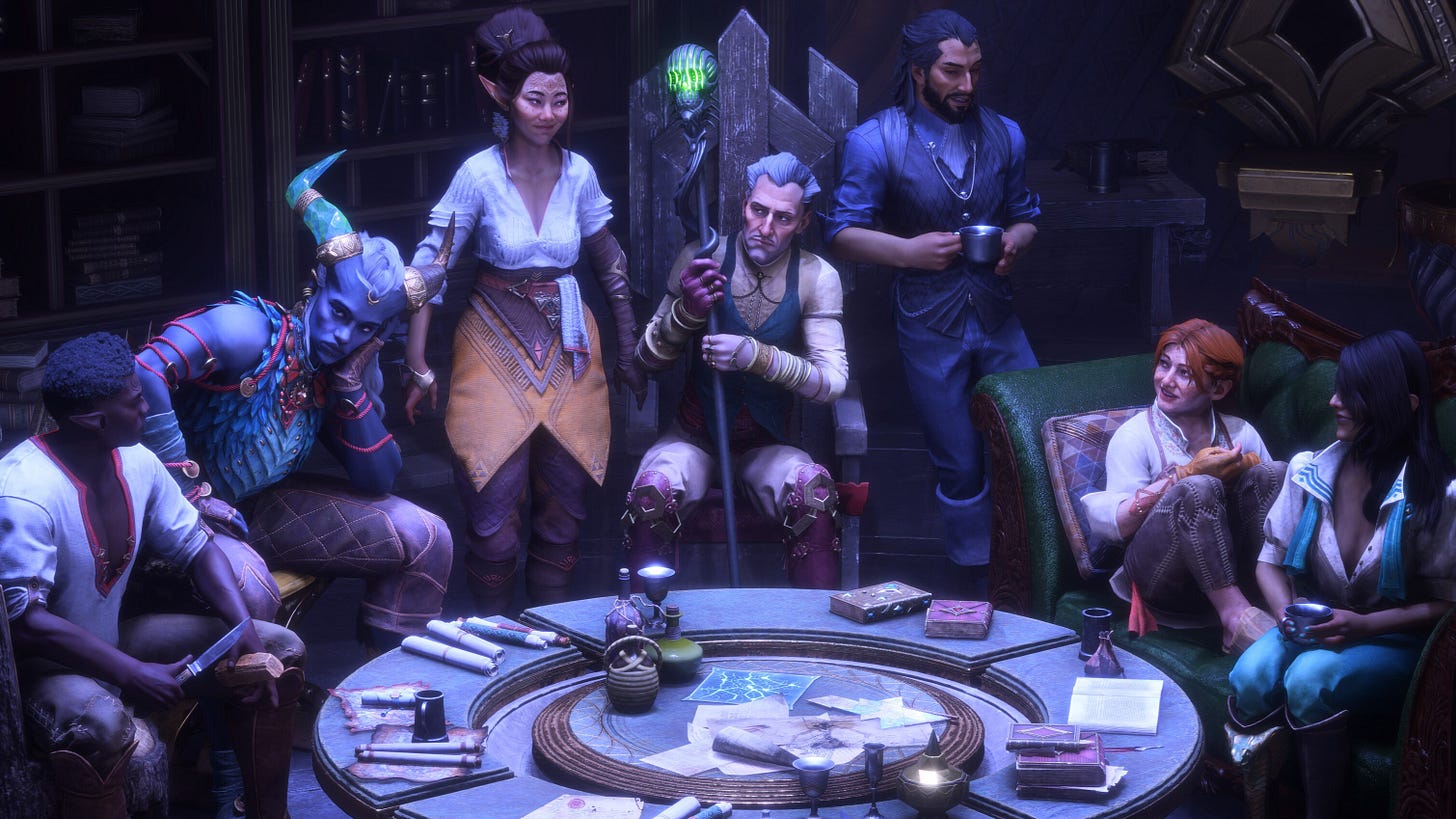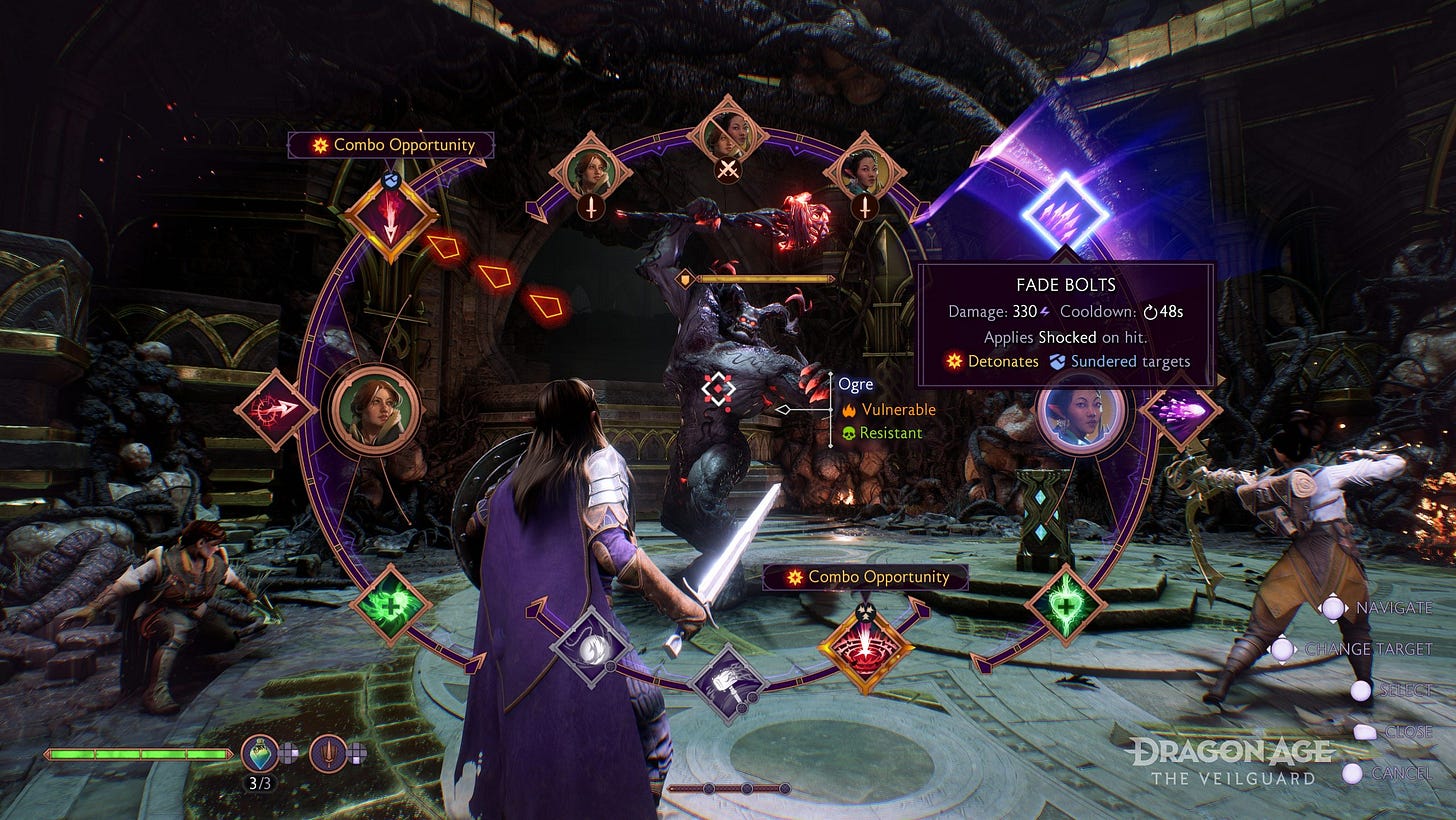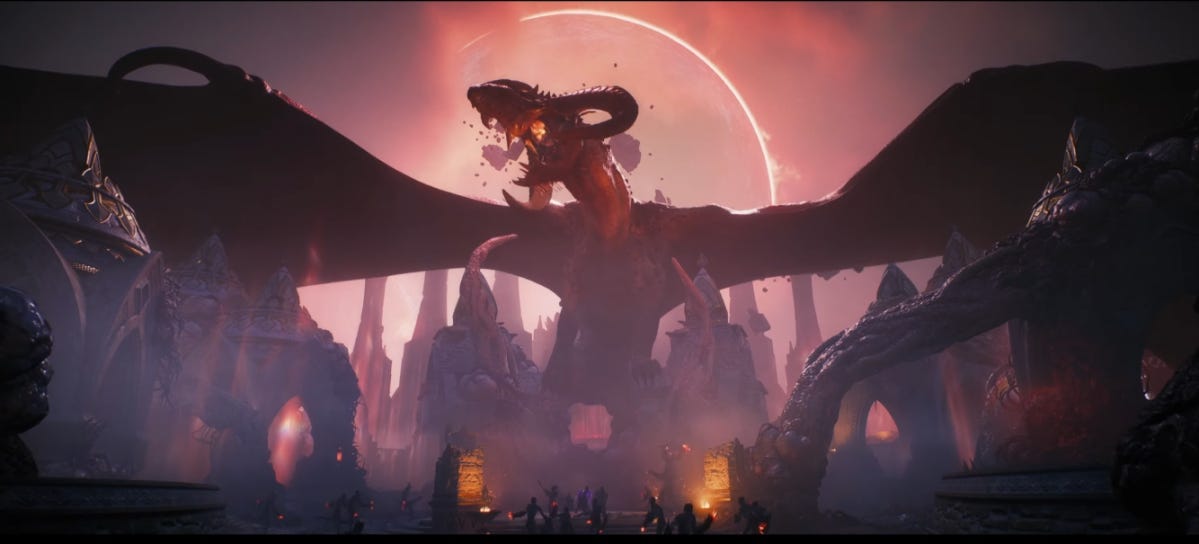Dragon Age: The Veilguard
Electronic Arts, BioWare
Corinne Busche, John Epler, Amber Vincent, Rob Davidson, Scylla Costa, Trick Weekes
October 31, 2024
PC, PS5, Xbox Series Consoles
Played on Xbox Series X
One of the best video game experiences I’ve ever had was playing through the Mass Effect trilogy in a few months when I got my hands on the PS3 release of all three games. I essentially played all three games like one long epic adventure. The result was a story of heroes, philosophy, great character arcs, solid music, and many emotional moments. Since then, I’ve been chasing that high, and unfortunately, BioWare hasn’t delivered it. I didn’t hate Mass Effect: Andromeda as much as everyone else did. If you were willing to look, there was some good stuff in there, but it was a downgrade from the original trilogy. I’ve never played a Dragon Age game before, and I decided it was time to change that. So, how would I feel about the series, and how would I feel about BioWare trying to be what we used to know them as? I’m happy to report that Dragon Age: The Veilguard is one of my standout gaming experiences, and I can say that BioWare is indeed back!
Plot, Characters, and Setting
So this is the type of game where role-playing really means something. The protagonist you play as is called by the nickname Rook, and you select a race and class with a background story. I chose the Grey Wardens and went with a warrior class. I also decided to go with dialogue choices that leaned on the comedic side but used more serious decisions when they needed it. You are recruited to stop Solas, an elven mage trying to destroy the veil, which, as a Dragon Age newbie, I gathered was critical in keeping the world in peace and away from the blight. Even though there is a lot of lore I didn’t understand right away, as a first-timer, I never felt confused about understanding the story. They also instantly provide a codex if you want to read and gobble up lore and information to understand the world better.
Needless to say, things go wrong in your first mission, and now you have to stand against two self-proclaimed elven gods ready to destroy the world. You’ll also have to get advice from Solas, who is in a sort of prison, and it’s up to you to determine how much you trust him. From a character study standpoint, he became one of the more interesting characters for me, as he is both a villain and an antihero simultaneously. From there, you’ll slowly recruit others to your cause and build on your relationships, or in one case romance, with them. As you progress through the game, those side characters will ask for your help as they go through their arcs and choices with real consequences. Considering we don’t have an entire trilogy to see your decision’s consequences, they did a great job making many of them important as you play on. The final act of the game reminded me of the Mass Effect 2 suicide mission, so if you want as many people to survive as possible, I would risk spoilers and do the research beforehand.
I personally adored these characters. Some seemed polarizing to the community, but none ever bored me or I found annoying. Neve, who I chose to be my character’s love interest, had a story with a bit of a Batman story arc that I loved. Lucanis was another interesting one, with a story based around family betrayal and fighting the demon inside of you, literally in his case. I LOVED Emmerich, a necromancer who is an overly excited professor. I got Frasier vibes from him, so I loved his character as a fan of that show. There’s also an interesting arc as he fears death and grapples with becoming immortal. He also has a sidekick that I was pretty excited to join in when I recruited him. Bellara is a bit eccentric and has to deal with shocking revelations for her elven people, and she probably would’ve been my romance pick if it wasn’t for Neve. Harding, who I believe was also part of the previous game, is a dwarf who discovers ancient secrets about her race. Davrin, another grey warden like me, has what I thought was a weaker story but is still interesting as it deals with Gryphons and a cool side villain. Last but not least is Taash, whose story is about identity and was criticized as it deals with the modern debate around pronouns. Some were against it immediately, and others felt it was a bit heavy-handed. I have to say, as someone who felt the Barbie movie was a bit heavy-handed, I did not feel this way about this one. If anything, Taash was one of the character arcs I liked following.
This is a story and world that felt rich to me. One of the two main criticisms I’ve seen is that the game feels like a PG-13 version of the series. I haven’t played the other three, so maybe there is something to that, but I thought there was some mature and deep stuff in the character stories as you get closer to the end. The other gripe I heard was around the dialogue, and I, for my life, did not see anything that came off as bad dialogue. Again, maybe series veterans are coming in with high expectations, but I never rolled my eyes or found myself cringing. By the end of the game, after doing every character arc, every mission, and spending over 100 hours in this world, I was satisfied with the story. If I had one minor gripe, the villains could have been a bit more memorable, but they got the job done.
Gameplay and Fun Factor
The main gameplay loop for Dragon Age: The Veilguard starts with a mission, traveling through the crossroads or warping to the land you need to be in, and then going through a semi-sandbox-style world I can best explain as a guided open world. As someone starting to get a little tired of the giant open worlds, I appreciated how they tackled the areas here. I never felt overwhelmed or like I had to do everything. I did everything because I chose to out of the fun I was having, not because it felt like a chores list. I want more games to learn from this approach; I’m looking at you, Ubisoft.
The combat felt nice. There are plenty of weapons to choose from; each one feels different and has different effects. You also have magic you can use, similar to some of the Mass Effect abilities. Your companions help you fight, but it feels satisfying when you start doing combo attacks and spells, especially when fighting bosses. Once you get the basic combat and spells figured out, you’ll mow down enemies and feel like a badass. As expected for an RPG, you’ll get experience points that can be used in a skill tree for yourself and your allies. I felt the skill tree and upgrades could’ve been better. Don’t get me wrong—it gets the job done, and you can upgrade your characters to be fighting machines, but I wish they had more variety and ways to defend yourself or add more health.
The main thing I loved about this game is how every main side quest felt different. Usually, side quests get repetitive and get the “chore list” feeling, but Veilguard makes every side mission feel important - the main side missions. The game now and then sends you on “conversation” side missions that always got an eye roll out of me. They have some important moments for the supporting characters, but they didn’t have to send me on a wild goose chase to have a quick talk. The Lighthouse is the game's central hub, where you have conversations with your allies and advance stories. They should’ve kept these conversation side quests there.
Graphics, Presentation, and Soundtrack
There was a big fuss when the game was revealed about its chosen art style. The game has a more animated/cartoony style than many expected over the past more realistic look. I have to say, the art style didn’t bother me. If anything, I think this game has some gorgeous locations. There were plenty of times I stopped and looked around. The detail and care of the architecture are incredible. What I liked too is that every land had a different look in architecture and design, really making it feel like I was in a different culture, which adds to making the world have personality and feel alive.
The soundtrack is composed by Hans Zimmer and Lorne Balfe. Now, I’m not going to tell you this is one of the best soundtracks in gaming, but it feels epic and adventurous when it needs to and adds to the experience. They nail the score in the more dramatic moments, and the final act’s score really pumps your adrenaline up. If I had to say one minor gripe, the soundtrack leans too heavily on aiming to sound like an epic orchestral score. I would have liked some more calm moments in the music. Nevertheless, it’s a solid score that doesn’t ruin the adventure.
Grade - S
Must Play Masterpeice
Dragon Age: The Veilguard is the closest I have ever come to getting the experience I had back in 2013. With a lot going on in my personal life, this mental health medicine game had me go through an epic high fantasy adventure with a slew of characters I grew to love and a story that I felt satisfied completing. Sometimes, you finish a game, and as the credits roll, you know you just experienced one of these gaming moments you won’t forget. I got that feeling when the credits rolled here. Dragon Age: The Veilguard delivers precisely what I was looking for, and my anticipation for Mass Effect 5 grew higher after this.
Pros
+ The best character ensemble of the year
+ Never felt bored with any of the story quests or companion main side quests
+ Combat feels nice and you can feel like a badass once you get the hang of it
+ Beautiful and detailed worlds with gorgeous graphics
+ Traveling through the world never felt overwhelming
+ Choices feel like they have consequences and never wasted
+ The final act is Mass Effect 2 levels of good when it comes to endings
+ Rich and alive world with personality, different cultures, and memorable characters
+ Solas is one of the more interesting characters of the year
Cons
- Conversation side quests are completely unnecessary








